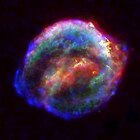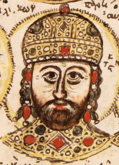Wikipedia:Main Page history/2024 January 6
From today's featured article
A supernova is a powerful explosion of a star, usually a star that is unable to produce sufficient energy from nuclear fusion to counteract its own gravity. Its remnant will become a diffuse nebula, neutron star or black hole. The peak optical luminosity of a supernova can be comparable to that of an entire galaxy before fading over several weeks or months. Supernovae occur in the Milky Way on average about three times every century; the last one directly observed was Kepler's Supernova (remnant pictured) in 1604. The most recent naked-eye supernova from another galaxy was SN 1987A, the explosion of a blue supergiant star in the Large Magellanic Cloud, a satellite of the Milky Way. Supernovae can expel several solar masses of material at velocities up to several percent of the speed of light. They are a major source of cosmic rays, and also the chemical elements from oxygen to rubidium on the periodic table. White dwarfs can also produce supernovae, if they gain enough mass to trigger runaway fusion. (Full article...)
Did you know ...
- ... that the Great Divine Temple of Caodaism holds the cosmos ball (pictured), which represents the Jade Emperor's universe?
- ... that the curator aedium sacrarum et operum locorumque publicorum was responsible for the upkeep of public works and buildings in ancient Rome?
- ... that British intervention reversed the lacquering of a statue in New Zealand?
- ... that Harry Dunn guarded a stairwell and Nancy Pelosi's office during the January 6 United States Capitol attack?
- ... that the Kansas Business Hall of Fame includes the founders of Pizza Hut and Russell Stover Candies?
- ... that three first-team All-Americans – Logan Eggleston, Zoe Fleck, and Asjia O'Neal – played on the University of Texas's NCAA volleyball championship team in 2022?
- ... that the WoodmenLife Tower hosts a livestream of a peregrine falcon nest on its 28th floor?
- ... that Genghis Khan was extremely charismatic and renowned for his generosity towards his followers?
In the news
- In darts, Luke Humphries (pictured) wins the PDC World Championship.
- In Kerman, Iran, at least 89 people are killed by Islamic State bombings during a ceremony commemorating the assassination of Qasem Soleimani.
- Japan Airlines Flight 516 collides with a Japan Coast Guard airplane at Tokyo's Haneda Airport, killing five aboard the latter aircraft.
- Lee Jae-myung, the leader of the South Korean opposition, is hospitalized following a stabbing attack in Busan.
On this day
- 1449 – Four years before the fall of Constantinople, Constantine XI Palaiologos (pictured) assumed the throne as the last Byzantine emperor.
- 1724 – Sie werden aus Saba alle kommen, a Bach cantata for Epiphany, was first performed in Leipzig.
- 1912 – German geophysicist Alfred Wegener presented his theory of continental drift, the precursor of plate tectonics.
- 1953 – The inaugural Asian Socialist Conference, an organisation of socialist political parties, opened in Rangoon with 177 delegates, observers and fraternal guests.
- 2014 – The first episode of the documentary series Benefits Street aired on Channel 4, prompting discussion in the United Kingdom about welfare dependency.
- Baltasar Hidalgo de Cisneros (b. 1756)
- Earl Scruggs (b. 1924)
- Babrak Karmal (b. 1929)
- Sybil Plumlee (d. 2012)
Today's featured picture

|
The Kefermarkt altarpiece is a richly decorated wooden altarpiece in the Late Gothic style in the parish church of Kefermarkt in Upper Austria. Commissioned by the knight Christoph von Zelking, it was completed around 1497. Saints Peter, Wolfgang and Christopher are depicted in the central section. The wing panels depict scenes from the life of Mary, and the altarpiece also has an intricate superstructure and two side figures of Saints George and Florian. The identity of its maker, known by the notname Master of the Kefermarkt Altarpiece, is unknown, but at least two skilled sculptors appear to have created the main statuary. Throughout the centuries, it has been altered and lost its original paint and gilding; a major restoration was undertaken in the 19th century under the direction of Adalbert Stifter. The altarpiece has been described as "one of the greatest achievements in late-medieval sculpture in the German-speaking area". This image shows the lower-right wing panel of the Kefermarkt altarpiece, depicting the Adoration of the Magi. Mary gazes on the infant Christ while one of the Magi is kneeling in front of him; the child plays with the gold in the box he is bringing. Both he and the second of the Magi, behind him, have taken off their hats as a mark of respect. Sculpture credit: Master of the Kefermarkt Altarpiece; photographed by Uoaei1
Recently featured:
|
Other areas of Wikipedia
- Community portal – The central hub for editors, with resources, links, tasks, and announcements.
- Village pump – Forum for discussions about Wikipedia itself, including policies and technical issues.
- Site news – Sources of news about Wikipedia and the broader Wikimedia movement.
- Teahouse – Ask basic questions about using or editing Wikipedia.
- Help desk – Ask questions about using or editing Wikipedia.
- Reference desk – Ask research questions about encyclopedic topics.
- Content portals – A unique way to navigate the encyclopedia.
Wikipedia's sister projects
Wikipedia is written by volunteer editors and hosted by the Wikimedia Foundation, a non-profit organization that also hosts a range of other volunteer projects:
-
Commons
Free media repository -
MediaWiki
Wiki software development -
Meta-Wiki
Wikimedia project coordination -
Wikibooks
Free textbooks and manuals -
Wikidata
Free knowledge base -
Wikinews
Free-content news -
Wikiquote
Collection of quotations -
Wikisource
Free-content library -
Wikispecies
Directory of species -
Wikiversity
Free learning tools -
Wikivoyage
Free travel guide -
Wiktionary
Dictionary and thesaurus
Wikipedia languages
This Wikipedia is written in English. Many other Wikipedias are available; some of the largest are listed below.
-
1,000,000+ articles
-
250,000+ articles
-
50,000+ articles




